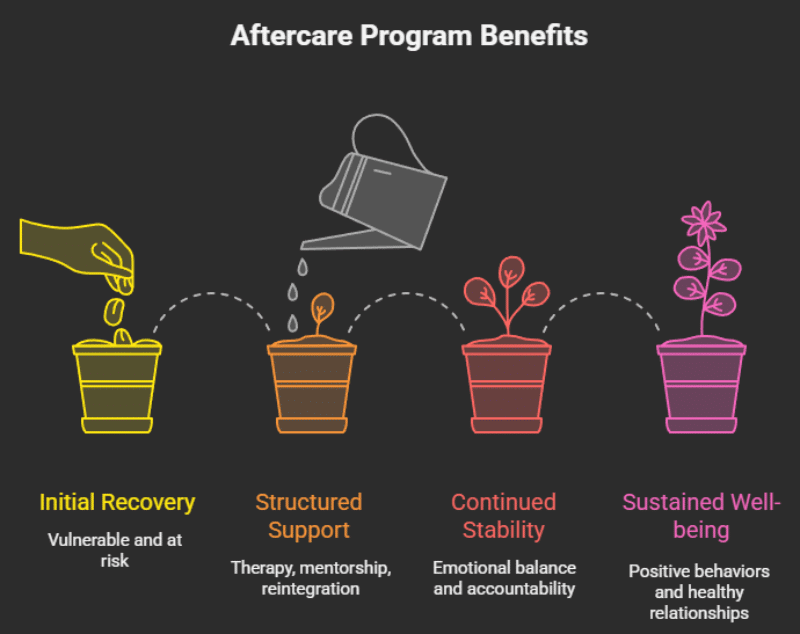When a teen completes a program at a Therapeutic Boarding School for Troubled Teens, it’s a major milestone — but it’s not the finish line. True healing continues long after the program ends.
That’s why the best therapeutic schools emphasize family involvement and aftercare planning from day one. These two components are key to ensuring lasting progress, smoother transitions home, and stronger family connections.
Let’s explore how family engagement and structured aftercare work hand-in-hand to support long-term success — and why parents should look for programs that prioritize both.
Key Takeaways
- Family involvement is vital to long-term success in recovery.
- Aftercare programs provide emotional, academic, and social stability after treatment.
- Ongoing support helps teens apply learned skills in real-life situations.
- Parents play an ongoing role in communication, structure, and encouragement.
- Failure to launch programs can further assist young adults transitioning toward independence.
The Power of Family Involvement in Teen Recovery
Teens don’t heal in isolation. Family plays a critical role in their emotional, behavioral, and social development. When parents, guardians, and siblings participate in the therapeutic process, the outcomes improve significantly.
Why Family Participation Matters
- Reinforces Therapy Goals: Teens see consistency between what they learn in treatment and what’s practiced at home.
- Improves Communication: Family therapy helps rebuild trust, reduce conflict, and teach healthy communication patterns.
- Encourages Accountability: Teens feel supported — but also responsible — when parents stay engaged in the process.
- Prepares for Re-entry: Family involvement smooths the transition from a structured school environment back to daily life.
In other words, family involvement transforms treatment from an individual journey into a shared path toward healing.
Common Family Therapy Approaches
Most Therapeutic Boarding Schools for Troubled Teens use evidence-based family therapy models that focus on understanding and improving family dynamics.
Some common approaches include:
| Therapy Type | Focus | Typical Outcome |
|---|---|---|
| Structural Family Therapy | Identifying unhealthy patterns in relationships | Clearer family roles and boundaries |
| Systemic Family Therapy | Understanding how one member’s behavior affects the whole | Increased empathy and problem-solving |
| Emotionally Focused Therapy (EFT) | Healing attachment wounds | Strengthened emotional bonds |
| Parent Coaching Workshops | Teaching parents effective communication and discipline | Consistent home environment |
These sessions often happen weekly, either in person or through virtual platforms, ensuring that parents stay connected and informed even from a distance.
Aftercare: The Bridge Between Treatment and Real Life
Aftercare is the period following a teen’s graduation from a therapeutic program — and it’s one of the most important stages of recovery. It helps teens maintain stability and continue applying the skills they learned while in treatment.
What a Strong Aftercare Program Looks Like
An effective aftercare plan includes:
- Ongoing Therapy: Continued counseling sessions for emotional support and relapse prevention.
- Family Check-ins: Scheduled family therapy or progress updates to monitor communication and boundaries.
- Academic Support: Assistance with transitioning back to traditional school or college preparation.
- Peer Support Networks: Alumni programs and group meetings that keep teens connected with positive influences.
- Life Skills Coaching: For older teens or young adults, this can include guidance on employment, budgeting, and independence.
At Help Your Teen Now, many families also explore young adult transitional programs or failure to launch programs — especially for students who need extra time to develop confidence, structure, and self-sufficiency before fully reintegrating into everyday life.
Benefits of Aftercare Programs
The goal of aftercare isn’t just to “check in.” It’s to empower. Teens who receive structured post-program support are more likely to maintain positive behaviors, avoid relapse, and pursue healthy relationships.
Some key benefits include:
- Continued emotional stability through therapy and mentorship
- Smoother reintegration into family, school, or work life
- Reduced risk of regression or relapse into old patterns
- Ongoing accountability and connection with supportive peers
These programs give teens a roadmap for navigating challenges independently — while knowing help is always available.

How Parents Can Stay Engaged After Graduation
Even after your teen returns home, your involvement remains essential. Here are a few practical steps to help maintain progress:
- Maintain consistent communication. Encourage open dialogue about emotions, goals, and daily experiences.
- Continue therapy. Family or individual counseling ensures growth doesn’t stop after discharge.
- Establish structure at home. Routine builds stability and helps reinforce what your teen learned in treatment.
- Set realistic expectations. Healing takes time — celebrate progress, not perfection.
- Stay connected with the program. Many therapeutic schools offer alumni events, check-ins, or parent support networks.
Conclusion: Recovery Is a Family Journey
The most effective Therapeutic Boarding Schools for Troubled Teens know that transformation doesn’t happen in isolation — it happens through consistent family support and structured aftercare.
When families stay involved and follow through with a clear aftercare plan, the chances of long-term healing, confidence, and stability grow dramatically.
If your teen or young adult is struggling to maintain progress after treatment, or if you’re considering enrolling them in a program designed for full-family healing, help is available.
Contact Help Your Teen Now to help your teen now. Our team will connect you with trusted, accredited therapeutic programs that specialize in family engagement and lasting aftercare.






0 Comments